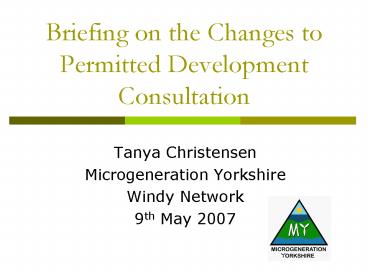Briefing on the Changes to Permitted Development Consultation - PowerPoint PPT Presentation
1 / 11
Title:
Briefing on the Changes to Permitted Development Consultation
Description:
Briefing on the Changes to Permitted Development Consultation ... Installation of Microgeneration on ... levels for wind turbines and air source heat pumps ... – PowerPoint PPT presentation
Number of Views:26
Avg rating:3.0/5.0
Title: Briefing on the Changes to Permitted Development Consultation
1
Briefing on the Changes to Permitted Development
Consultation
- Tanya Christensen
- Microgeneration Yorkshire
- Windy Network
- 9th May 2007
2
Overview of Presentation
- General Background
- Relevance to other planning tools
- Background to the Consultation
- Principles underpinning the work
- General issues for Microgeneration
- Noise Criteria
- Wind Turbines
- Proposed Permitted Development
3
General Background
- Installation of Microgeneration on domestic
properties - Delivered through amendments to the General
Permitted Development Order 95 - Only covers England
- Closing date 27th June
4
Relevance to other planning tools
- PPS22 Renewable Energy Companion Guide
(non-statutory!) - PPS Planning and Climate Change (draft) expects
planning to be a positive force for change,
creating an attractive environment for innovation - Code for Sustainable Homes (CSH)
- Building a Greener Future Brings together
planning, building regulations and the CSH
5
Background to the consultation
- Householders Development Consent Review (HDCR),
January 2005. - Examined ways of reducing bureaucracy for
householders seeking to improve their homes - HDCR Steering Group Report 11 recs
- 1st Stage, Reform Part 1 2 of the GDPO
- Entec Report Review the provisions of GDPO.
Using an impact approach to make detailed
recommendations on how GDPO could be amended.
6
Principles underpinning the work
- Clear and robust arrangements should be in place
so that the interests of neighbours and the wider
community and environment are considered - Changes to current arrangements should be based
on evidence and fully tested - There should be full consultation on detailed
proposals for taking forward the recommendations
7
General Issues for Microgeneration
- Principle of an impact approach
- Protection for designated areas
- Listed Buildings
- Noise (Wind ASHPs)
- Controls on Visual Impact
- Sites of Biodiversity Geological Conservation
Value - Archeologically sensitive areas
8
Noise Criteria
- Limits on noise levels for wind turbines and air
source heat pumps - Rather than distance-based, now stating noise
levels at which likely to cause annoyance or
sleep disturbance - WHO 35dB guideline, subtract 5dB to allow for
multiple turbines in vicinity - Not a single limit but three criteria, as needs
to protect both internal and external environment - Habitable room not bathroom, kitchen or toilet
9
Noise Criteria
- Structure borne noise applied within a habitable
room with windows closed - Airborne noise, internal space applied 1m from
the external façade at the window to a habitable
room of any neighbouring residential property - Airborne noise, external space 50 of outdoor
private space to be protected - Use of 2nd 3rd criterion together will
determine siting of turbine away from façade of
neighbouring properties
10
Wind Turbines
- 3rd largest deployment potential, after solar
thermal PV - More characteristics with potential planning
impacts than any other microgen technology - Four key areas size scale safety nuisance
and the impact on bats - Potential impact of domestic wind turbines on
radar (further work) - Entec visual impact on local landscape small if
turbines small in size - Structural stability covered by Building Regs
11
Proposed Permitted Development
Wind on Building Limitation Height
(including blade) above highest part of roof 3m
Blade Diameter
2m Noise
As outlined at
Annex 2 Vibration
As outlined at Annex 2 Number of
turbines One on a building 15m or
less in height
Four on buildings above 15m.
Restriction in conservation areas and World
Heritage Sites No permitted
development Wind Stand Alone Height
(including blade)
11m Blade Diameter
2m Noise
As
outlined at Annex 2 Vibration
As outlined at Annex
2 Restriction in conservation areas and World
Heritage Sites Development
facing on to
and visible from a
highway































